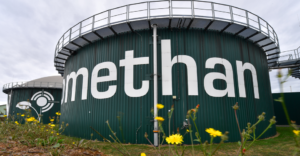
GTSU Operator LLC has received applications from more than 10 companies that are considering the construction of 31 biomethane plants in Ukraine with a production capacity of 225 million cubic meters per year, the company’s CEO Dmitry Lippa said Thursday at a parliamentary hearing on the development of alternative energy sources.
„The successful positioning of Ukrainian biomethane on the EU markets requires a detailed and balanced approach, which aims to develop mechanisms of cross-border trade in biomethane, in particular the removal of barriers to the sale of biomethane transported by the gas transportation system to the EU,“ – the company quoted his head as saying on Facebook.
Lippa said that Ukraine needs to unify regulatory requirements for biomethane with EU countries to remove domestic restrictions on its exports. We are talking about the harmonization of customs clearance of biomethane crossing the border, and issuing guarantees and certificates of its origin, which will be recognized both in the domestic and foreign markets.
The alternative energy industry also needs to create additional financial instruments of cross-border lending, which can be used to fully or partially cover the costs of producers to connect to the grid, the director of „GTSU Operator“ is sure.
In turn, Deputy Minister of Agrarian Policy Vitaly Golovnya noted the relevance of biomethane and bioethanol production for Ukraine because of problems with energy and logistics. „Import substitution, energy and economic security – the priority task of the state,“ – said the deputy minister, whose words are listed on the website of the Agrarian Ministry.
Deputy Minister noted that the production of bioethanol is food and food security, as bioethanol products are raw materials for many industries. In particular, for animal fodder and biogas plants that produce electricity or biomethane.
An MP from the faction „For the Future“ Serhii Labaziuk also pointed out the necessity of making changes in the legislation to unblock the export of biomethane. He considers it expedient to work out decrees on export and separately on the biomethane register which does not work to the full.
„We will fix the legislative gaps, streamline the biomethane market and give an impetus to launch investment in the development of alternative fuels. We are a large and powerful agrarian country, and should use to the maximum extent possible agro-waste, recycling their own products,“ he wrote on Facebook.
As reported, in April 2023 Hals Agro agricultural holding company launched Ukraine’s first biomethane plant in Chernihiv region with a capacity of 3 million cubic meters per year and expects to export the first lots of biomethane this year.

Der Bau eines Gebäudetechnik-Campus des irischen Herstellers von Energieisolierungen Kingspan soll im Jahr 2024 beginnen, und das Unternehmen hat bereits mit der Suche nach einem Standort in der Region Lemberg begonnen, da diese nahe an der Grenze liegt, wie aus einer Pressemitteilung von UkraineInvest vom Donnerstag hervorgeht.
Demnach wird der Campus sechs Produktionsbereiche umfassen, darunter die Herstellung von Dämmstoffen und Fernwärmelösungen. Der Campus wird Bauprodukte mit hoher Wertschöpfung herstellen. Das Projekt sieht die Schaffung einer umweltfreundlichen, kohlenstoffarmen Produktionsstätte vor.
Kingspan investiert Berichten zufolge über 200 Mio. EUR in den Bau, der etwa fünf Jahre dauern wird. Die Durchführung des Projekts wird 600-800 neue Arbeitsplätze schaffen.
Kingspan wurde 1965 in Irland gegründet und hat sich auf Baulösungen für Gebäudehüllen (Dächer, Wände, Fassaden) sowie auf Schutzwände, Kälteschutztüren, Hightech-Dämmstoffe aus massivem Urethan und massivem Phenolharz für Dächer, Wände, Böden und Rohrleitungen spezialisiert. Das Unternehmen betreibt weltweit 200 Produktionsstätten. Das Unternehmen kam 2005 in die Ukraine.
Im April 2022 gab Kingspan den Abschluss seines Ausstiegs aus dem russischen Geschäft bekannt. Auf Russland entfällt weniger als 1 % der weltweiten Aktivitäten des Unternehmens. Außerdem spendete sie 750.000 USD an UNICEF für die Einrichtung von fünf Blue-Dot-Zentren zur Unterstützung von Flüchtlingen an der ukrainischen Grenze.
UkraineInvest, das Amt für Investitionsanreize und -förderung des Ministerkabinetts der Ukraine, bietet Investoren organisatorische und beratende Unterstützung bei der Vorbereitung der Projektdurchführung.